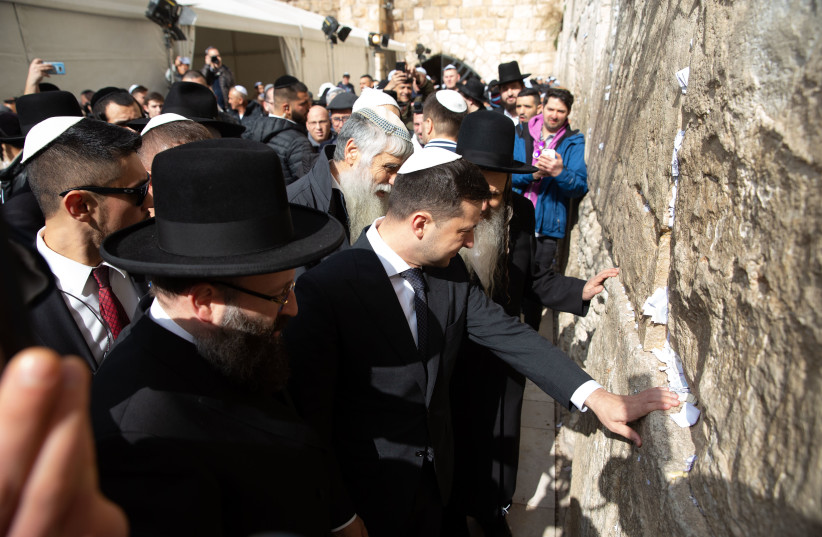Israel has returned its Ambassador to Poland, Yacov Livne, for the first time in six months as it scrambled over the weekend to rescue its citizens from war-torn Ukraine through overland routes into neighboring countries.
Livne was recalled in August over a crisis with respect to Holocaust restitution issues, that now pales in comparison to the larger issue of Russia's invasion into Ukraine that began Thursday morning.
The Foreign Ministry last week evacuated its embassy from Kyiv to Lviv. On Saturday, it relocated its staff to Poland but said they would cross back into Ukraine on a daily basis. Foreign Ministry staff is also stationed at the land crossings out of Ukraine to help Israelis.
The diplomatic-security cabinet is set to meet on Sunday afternoon to discuss the growing crisis.
Israel has sought in the last days to hold onto its tight ties with both the Ukrainian and the Russian governments. It has carefully orchestrated its comments with Foreign Minister Yair Lapid condemning Russia's invasion while Prime Minister Naftali Bennett has spoken of Israel's support for the Ukrainian people without mentioning Moscow.

Russia's Deputy Foreign Minister Mikhail Bogdanov called in Israel's Ambassador Alexander Ben Tzvi to explain his country's decision to embark on a military operation. He said it had done so to free the region of the Donbas as well as to demilitarize and to de-Nazify Ukraine, according to the Russian Foreign Ministry.
Ben Tzvi assured Moscow that Israel held the relations between the two countries in high regard.
At issue for Israel, in particular, is the need to continue its coordination with Russia in Syria, where Moscow has military forces stationed, Israel and Russia have a deconfliction agreement that allows the IDF to attack Iranian forces and their proxies in Syria.
Moscow clarified on Saturday that it plans to continue that military coordination with Israel in Syria, the Russian embassy said on Saturday.
"Our military officials discuss the practical issues of this substantively on a daily basis. This mechanism has proven to be useful and will continue to work," the Russian embassy in Israel said in a statement.
But while voicing support for Israel's security needs, it also reiterated opposition to violations of Syrian sovereignty.
The IDF, asked about prospects for continued coordination with Russia over Syria, said only that its forces "will act when needed to counter threats, defend the people of Israel and our sovereignty."
Israel whose main ally is the United States condemned the Russian invasion of Ukraine
The United States said on Thursday that there were no changes in its deconfliction mechanism with Russia over Syria, though the Ukraine crisis has sent Washington-Moscow relations spiraling.
Israeli leaders have held a series of diplomatic calls in the past 48-hours. Foreign Minister Yair Lapid spoke with US Secretary of State Antony Blinken on Thursday night. On Friday he also spoke with German Foreign Minister Annalena Baerbock.
Bennett spoke on Friday with Ukrainian President Volodymyr Zelensky, who wants Israel to help sway the Russians to halt their assault on Ukraine.
The public comments Bennett's office published after the call did not mention any condemnation of Russia or the request for back-channel diplomacy.
They did discuss Israel's plan to offer humanitarian aid, particularly medical assistance, to the Ukrainian people.
Lapid has also held a number of situational assessments with his ministry. Bennett held a large meeting on Ukraine on Thursday night at the Kiryah Military Headquarters in Tel Aviv to cement plans to send humanitarian aid to Ukraine as well as to assist Israelis and Jews who need to leave the county. There were 8,000 Israelis in Ukraine at the start of the fighting.
Embassy staff in Ukraine also helped three busloads of Israelis cross into Poland on Friday. No additional information has been published about plans to send humanitarian aid.
The Ukrainian Embassy In Tel Aviv called for volunteers among its citizens in Israel to return to help fight the Russians.
Reuters contributed to this report
